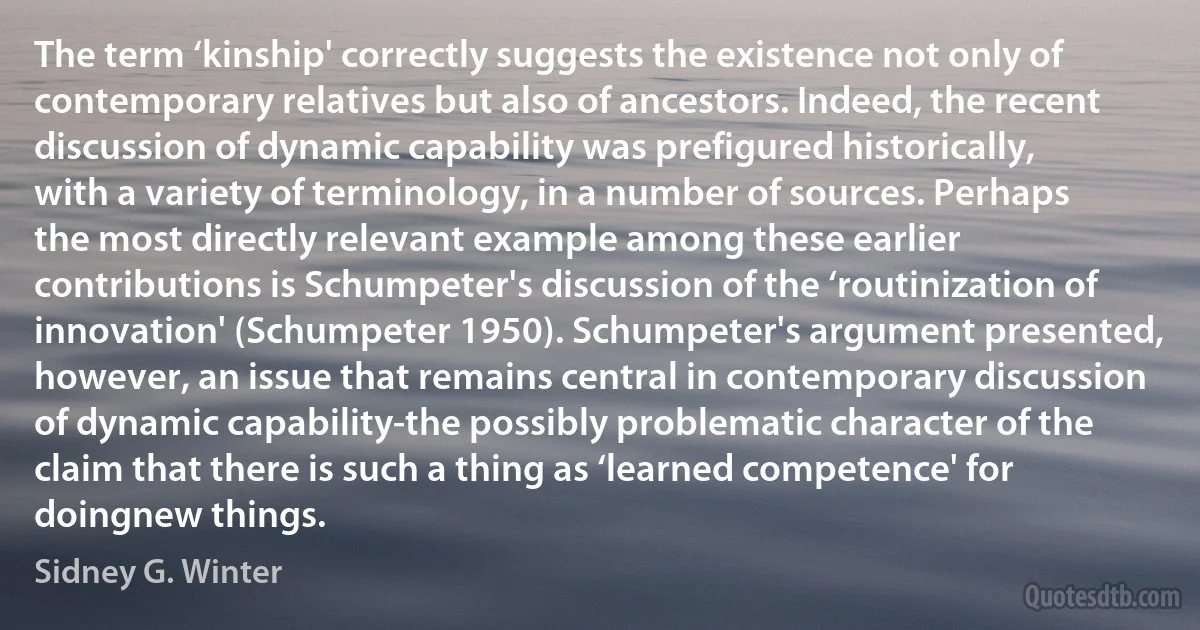
The term ‘kinship' correctly suggests the existence not only of contemporary relatives but also of ancestors. Indeed, the recent discussion of dynamic capability was prefigured historically, with a variety of terminology, in a number of sources. Perhaps the most directly relevant example among these earlier contributions is Schumpeter's discussion of the ‘routinization of innovation' (Schumpeter 1950). Schumpeter's argument presented, however, an issue that remains central in contemporary discussion of dynamic capability-the possibly problematic character of the claim that there is such a thing as ‘learned competence' for doingnew things.
Sidney G. WinterRelated topics
argument central character claim contemporary dynamic early example innovation number perhaps problematic terminology thing remains schumpeter thingsRelated quotes
New York is one of the capitals of the world and Los Angeles is a constellation of plastic, San Francisco is a lady, Boston has become Urban Renewal, Philadelphia and Baltimore and Washington wink like dull diamonds in the smog of Eastern Megalopolis, and New Orleans is unremarkable past the French Quarter. Detroit is a one-trade town, Pittsburgh has lost its golden triangle, St. Louis has become the golden arch of the corporation, and nights in Kansas City close early. The oil depletion allowance makes Houston and Dallas naught but checkerboards for this sort of game. But Chicago is a great American city. Perhaps it is the last of the great American cities.

Norman Mailer
We must resist the temptation to be "normal,” because those who are now considered normal accept the values and practices of an insane world. In modern society, for example, normal people strive to accumulate as many commodities as possible, because they believe that their success and personal worth are linked to the number of possessions they have acquired. As the joke goes, "The one who dies with the most toys, wins.” If we espouse this viewpoint, the toys we have to play with form the measure of our personal worth. Unfortunately, this notion confuses acquired material worth with our inherent worth as spiritual beings.

Bhakti Tirtha Swami
Leave alone Urdu pamphlets, a neatly published English book from the impeccably Islamic Noor Publishing House (Delhi), Muhammad Samiullah's Muslims in Alien Society, is sufficiently explicit about the demographic designs of contemporary Islam. Samiullah rejects family planning as a Western ploy to diminish the numbers of the Muslim population in order to maintain its hegemony. The core of his argument is that birth control has no sanction from the Quran nor from the example and sayings of the Prophet. Since others have claimed just the opposite, a close reading of the source texts of Islam is needed.

Koenraad Elst
In practice, quantum mechanics merely gives predictions with probabilities attached. This should be considered as a normal and quite acceptable feature of predictions made by science: different possible outcomes with different probabilities. In the world that is familiar to us, we always have such a situation when we make predictions. Thus the question remains: What is the reality described by quantum theories? I claim that we can attribute the fact that our predictions come with probability distributions to the fact that not all relevant data for the predictions are known to us, in particular important features of the initial state.

Gerardus 't Hooft
[I was] a youth in his twenty third year, young of his age, who had seen little or nothing of the world, who resigned himself to politics, but whose desire had been for the ministry of God. The remains of this desire operated unfortunately. They made me tend to glorify in an extravagant manner and degree not only the religious character of the State, which in reality stood low, but also the religious mission of the Conservative party. There was, to my eyes, a certain element of AntiChrist in the Reform Act and that Act was cordially hated. ... It was only under the (second) Government of Sir Robert Peel that I learned how impotent [and] barren was the conservative office for the Church.

William Ewart Gladstone
